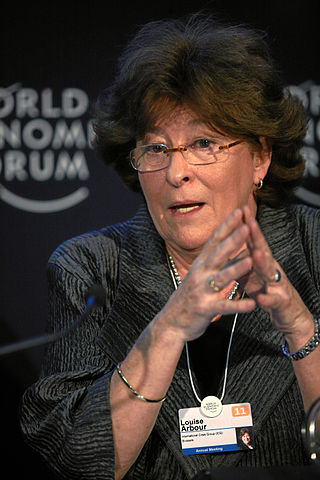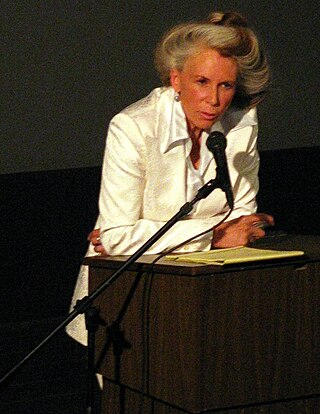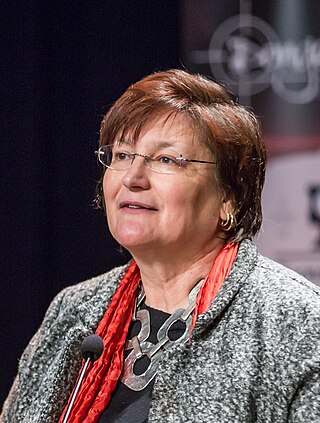Related Research Articles

Louise Arbour is a Canadian lawyer, prosecutor and jurist.

Catharine Alice MacKinnon is an American radical feminist legal scholar, activist, and author. She is the Elizabeth A. Long Professor of Law at the University of Michigan Law School, where she has been tenured since 1990, and the James Barr Ames Visiting Professor of Law at Harvard Law School. From 2008 to 2012, she was the special gender adviser to the Prosecutor of the International Criminal Court.
Sharyn Clough is professor of philosophy at Oregon State University.

Nancy Fraser is an American philosopher, critical theorist, feminist, and the Henry A. and Louise Loeb Professor of Political and Social Science and professor of philosophy at The New School in New York City. Widely known for her critique of identity politics and her philosophical work on the concept of justice, Fraser is also a staunch critic of contemporary liberal feminism and its abandonment of social justice issues. Fraser holds honorary doctoral degrees from four universities in three countries, and won the 2010 Alfred Schutz Prize in Social Philosophy from the American Philosophical Association. She was President of the American Philosophical Association Eastern Division for the 2017-2018 term.

Carole Pateman is a feminist and political theorist. She is known as a critic of liberal democracy and has been a member of the British Academy since 2007.
The Faculty of Law and Justice of the University of New South Wales is a law school situated in Sydney, Australia. It is widely regarded as one of Australia's top law schools. The 2021 QS World University Rankings rank the UNSW Law Faculty 13th in the world, first for undergraduate law in Australia, 2nd overall in Australia and 3rd in the Asia-Pacific region, and the 2021 Times Higher Education subject rankings also rank it second in Australia, making it the top ranked law school in New South Wales according to both tables, as well as being the top undergraduate Law school in the country.
The history of feminism in Canada has been a gradual struggle aimed at establishing equal rights. The history of Canadian feminism, like modern Western feminism in other countries, has been divided by scholars into four "waves", each describing a period of intense activism and social change. The use of "waves" has been critiqued for its failure to include feminist activism of Aboriginal and Québécois women who organized for changes in their own communities as well as for larger social change.
Hilary Christiane Mary Charlesworth is an Australian international lawyer. She has been a Judge of the International Court of Justice since 5 November 2021, and is Harrison Moore Professor of Law and Melbourne Laureate Professor at the University of Melbourne, and Distinguished Professor at the Australian National University.
Shirin M. Rai, is an interdisciplinary scholar who works across the political science and international relations boundaries. She is known for her research on the intersections between international political economy, globalisation, post-colonial governance, institutions and processes of democratisation and gender regimes. She was a professor of politics and international studies at the University of Warwick, and is the founding director of Warwick Interdisciplinary Research Centre for International Development (WICID).
Australia has a long-standing association with the protection and creation of women's rights. Australia was the second country in the world to give women the right to vote and the first to give women the right to be elected to a national parliament. The Australian state of South Australia, then a British colony, was the first parliament in the world to grant women full suffrage rights. Australia has since had multiple notable women serving in public office as well as other fields. Women in Australia with the notable exception of Indigenous women, were granted the right to vote and to be elected at federal elections in 1902.

Women in law describes the role played by women in the legal profession and related occupations, which includes lawyers, paralegals, prosecutors, judges, legal scholars, law professors and law school deans.
Feminist institutionalism is a new institutionalist approach that looks at how gender norms operate within institutions and how institutional processes construct and maintain gender power dynamics. Feminist institutionalism focuses on how institutions are gendered and how their formal and informal rules play a part in shaping political life. It offers a new way of interpreting the formation of institutions that goes beyond traditional views by accounting for the gendered stigma and gendered outcomes that comes with institutions. As a result, feminist institutionalism is changing the face of various institutions by providing awareness into their very own dynamics of inclusion and exclusion.
Nicola Mary Lacey, is a British legal scholar who specialises in criminal law. Her research interests include criminal justice, criminal responsibility, and the political economy of punishment. Since 2013, she has been Professor of Law, Gender and Social Policy at the London School of Economics (LSE). She was previously Professor of Criminal Law and Legal Theory at LSE (1998–2010), and then Professor of Criminal Law and Legal Theory at the University of Oxford and a Senior Research Fellow of All Souls College, Oxford (2010–2013).

Kim Rubenstein is an Australian legal scholar, lawyer and political candidate. She is a professor at the University of Canberra.
The Victoria Schuck Award is an annual prize granted by the American Political Science Association to the author of the best book published in the previous year on the topic of women and politics. The award is named in honor of the political scientist Victoria Schuck. Although a number of area-specific sections of the American Political Science Association have dedicated book awards, the Schuck Award is one of only a few awards given directly by the Association rather than by a subsection of it.
Mona Lena Krook is an American political scientist. She is a Professor of Political Science at Rutgers University, where she is also the Chair of the Women and Politics Ph.D. Program. She studies the political representation of women, particularly gender quotas in governments and the phenomenon of violence against women in politics.
Jacqui True is a political scientist and expert in gender studies. She is a professor of international relations at Monash University, where she is also Director of the Centre for Gender, Peace and Security. She studies international relations, gender mainstreaming, violence against women and its connections to political economy, and the methodology of feminist social science.
Susan Franceschet is a Canadian political scientist. She is a professor of political science at The University of Calgary. She studies the representation of women both in legislatures and government cabinets, gender quotas for the minimum representation of women in government, and the interaction of gender and public policy. She has written about women's participation in the politics of Chile.

Fiona Mackay is a professor of Politics at the University of Edinburgh. Mackay is also director of genderED, the University of Edinburgh's interdisciplinary hub for gender and sexuality studies. She is a Fellow of the Royal Society of Edinburgh and a Fellow of the Academy of Social Sciences.
Deborah Jane Brennan is an Australian Professor in social policy research, who was awarded a Member of the Order of Australia, in the Queens Birthday Honours list, in 2022, for her significant service to social policy research, gender equity and tertiary education.
References
- 1 2 3 "Scientia Professor Louise Chappell". University of New South Wales. Retrieved 8 April 2020.
- ↑ Westhues, Anne (1 April 2004). "Review Gendering Government: Feminist Engagement with the State in Australia and Canada". Canadian Review of Social Policy (53): 196.
- ↑ True, Jacqui (1 December 2004). "Book Review: Louise A. Chappell, Gendering Government: Feminist Engagement with the State in Australia and Canada (Vancouver: University of British Columbia Press, 2002), pp. 224, paper Can$27.95". Political Science: Leadership in New Zealand. 56 (2): 136–138. doi:10.1177/003231870405600217. S2CID 145183145.
- ↑ Vickers, Jill (1 September 2003). "Review of Gendering Government: Feminist Engagement with the State in Australia and Canada". Canadian Journal of Political Science. 36 (4): 929–930.
- ↑ "Victoria Schuck Award". American Political Science Association. 2018. Retrieved 8 April 2020.
- ↑ von Gall, Anna (November 2016). "Book Review Louise Chappell. The Politics of Gender Justice at the International Criminal Court: Legacies and Legitimacy". European Journal of International Law. 27 (4): 1176–1181. doi: 10.1093/ejil/chw070 .
- ↑ Zwingel, Susanne (March 2017). "The Politics of Gender Justice at the International Criminal Court: Legacies and Legitimacy. By Louise Chappell. Oxford, New York: Oxford University Press, 2016. 276 pp. $29.95 (paperback)". Politics & Gender. 13 (1): 171–174. doi:10.1017/S1743923X16000659. S2CID 151787407.
- ↑ Chappell, Louise (20 March 2014). "Sex and politics: a return to business as usual". ABC News Australia. Retrieved 8 April 2020.
- ↑ Louise Chappell; Natalie Galea (6 December 2016). "Construction is the last frontier for women at work". The Sydney Morning Herald. Retrieved 8 April 2020.
- ↑ Louise Chappell; Lindon Coombes (11 April 2019). "No matter who is elected, more work remains on women's rights and Indigenous issues". The Conv. Retrieved 8 April 2020.
- ↑ "Scientia Professors". University of New South Wales. Retrieved 8 April 2020.
- 1 2 "ASSA elects thirty-nine new fellows in 2016" (PDF). Academy of the Social Sciences in Australia. 21 September 2016. Retrieved 8 April 2020.
- 1 2 "Louise Chappell". ABC News. 2014. Retrieved 8 April 2020.